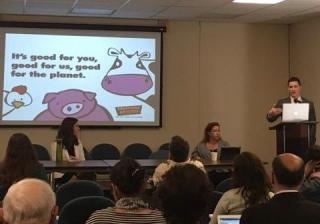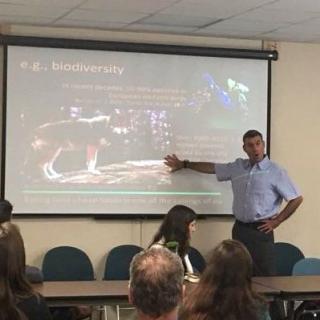Ethical Eating: A Solution to Climate Change
By Global Connections & Emerging Communities
As climate change continues on its current course, it becomes an increasing existential threat to human civilization. The Unitarian Universalist United Nations Office’s (UU-UNO’s) Climate Justice Initiative is compelled to acknowledge this threat, and try to find solutions from a theological standpoint. As such, as Unitarian Universalists we are called to discuss the ethical dimensions of Climate Change, and we reflect on our 7th Principle, respect for the interdependent web of all existence, to frame our work.
To adequately address the ethics of climate change, it is crucial to examine issues relating to food. Although not a widely discussed topic, the consumption choices that humans make, both in food choices and in food sourcing, are an enormous contributor to climate change. The UU-UNO has begun collaboration with the Tzu Chi Buddhist Foundation around the topic of Ethical Eating. This is a topic that some Unitarian Universalists have been engaged with for many years: in 2011, the Unitarian Universalist Association adopted a Statement of Conscience about ethical eating, urging UUs to be mindful of their relationship with food as part of respecting and acting compassionately towards all life on the planet. On May 19, 2016 the UU-UNO and Tzu Chi held a joint panel discussion “Ethical Eating: A Solution to Climate Change” at the United Nations Church Center in New York City.
This panel spoke broadly on the environmental and moral impacts of food, and more pointedly on the implications of meat consumption. As one panelist explained, “Ethical Eating is to eat to minimize adverse impacts and maximize positive impacts on the environment and yourself.” Our four panelists delved deeply into an analysis of the scientific and ethical problems created by climate change and what individuals can do to in the journey towards living a more climate-friendly lifestyle.
The first of the four esteemed panelists was Brent Kim, who serves as the Program Officer for the Johns Hopkins Center for a Livable Future. Kim addressed the current dogma that a shift from fossil fuels to renewable energy is paramount to solving the issue. Noted was the Paris Agreement, so far signed by 177 countries, in which nations agreed to to keep global temperature rise to less than 2 degrees Celsius. Kim argued that even this value, which will still contribute to over 15 feet of sea level rise, will be impossible to achieve through a switch to renewable energy unless we significantly modify our eating habits towards foods with lower GHG impact. This means consuming largely plant based foods – a 75% reduction of meat, dairy and eggs would be the equivalent of closing 94 coal- fired plants and opening over 100, 000 wind turbines.
Gidon Eshel, a Research Professor at Bard College followed, and discussed the specifics of the caloric differences in food, as related to their calories in fossil fuels. Eshel explained that approximately 31 calories of fossil fuels are needed to produce every one calorie of meat, as opposed to 1.5 calories of fossil fuels to every one calorie of plants. He emphasized that a plant-based diet not only mitigates the progression of climate change, but can also feed more of the world’s population. Growing vegetables takes up less land than livestock, and the land used for livestock grazing could be diverted towards other vegetable crops. It is important to note that neither Kim nor Eshel advocated for the complete elimination of meat products from the diet, as some land is soil poor and only appropriate for grazing purposes.
To add a new dimension into this panel discussion, the theological and social justice dimensions of food were introduced by our next panelist, the Rev. Peggy Clarke. Clarke led us through a philosophical reasoning on how humans have allowed for climate change to occur, and why we have been ineffective in its mitigation. She introduced to participants the paradigm in which we reside, in which we as humans see all other life as being in service of human life, and the earth is both the supplier and sewer for our lives. She emphasized that in order to actually address climate change, we must address this paradigm. Humanity is experiencing a great need for reverence not just for all life, but for the earth itself.
A theological underpinning in hand, we then turned to food policy – what is being done and what can we do to address current food policy which influences how so many of us eat. Participants heard from Ali Hard, a Tisch Scholar at the Laurie M. Tisch Center for Food, Education & Policy at Teachers College in Columbia University. Hard emphasized the need for sustainability standards in the dietary guidelines, and how such a policy would promote more responsible sourcing in school food programs, including a reduction in meat based meals. She explained that the way to achieve healthy sustainable diets is to create policy that promotes increased access to healthy sustainably grown and sourced foods, that encourages education about the value of a plant-based diet, and that provides supportive communities that inspire sustainable eating and living.
The point is not for all humans to immediately put down their bacon burgers and cheese omelets and become vegan right away, but to be mindful of the impact their food choices have on the environment. Try changing one meal per week to be entirely plant-based. As Unitarian Universalists, we recognize that many food decisions will require us to make trade- offs between competing priorities. Ethical Eating is a change we can each make to help the environment, and of course there is no single answer for how to mitigate climate change; food is but one factor in a multidimensional conversation. The UU-UNO’s work collaborating with Tzu Chi on ethical eating will continue in the upcoming months, building up to Ethical Eating Day on January 11, 2017, where we ask those interested to adopt a plant based diet for the day.
By Mara Moss, UU-UNO Climate Justice Initiative Intern


